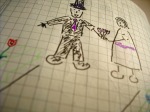“We the people of the United States, in order to form a perfect union, establish justice, insure domestic tranquility, provide for the common defense, promote the general welfare, and secure the blessings of liberty to ourselves and our prosperity, do ordain and establish this Constitution for the United States of America.” – Preamble (September 17, 1787)
These words and this document penned in 1787 by James Madison, the individual who is aptly referred to as “The Father of the Constitution,” adopted by the Constitutional Convention on September 17 of that year, and ratified on 21 June 1788, spark a torrent of discussions, comments, and questions concerning the great political and social experiment known as the United States of America. This is exactly the way in which the United States begins, as an “experiment.” A small conglomeration of former British Colonies, each diverse, each unique, each individualistic (just as her citizens are), now united under a document that forms the base for government and society for all citizens in the newly formed republic.
The main question is why, why did our forefathers create this Constitution of the United States instead of simply establishing a government to rule the people? The best response to offer to this question is to understand the world in which our founding fathers lived, the society and culture in which they existed, and most importantly the ideas of independence that they and the American Colonists fought and died to bring to fruition.
Liberty and tyranny, independence and authority, autonomy and monarchy; these are words synonymous with the American Revolution and the establishment of constitutionalism within the United States. These terms stand to represent a divergence from Colonial Britain to the formation of a new republic, a republic of former colonists bent on creating a government “of the people, and by the people.” Interestingly enough the British Empire had, at this time, already developed and incorporated the most liberal government that the world had seen… until this point. Under the British government, all the while shouting “Rule Britannia,” they had formed the foundation of a Parliamentary Monarchy. A system of government that encompassed the globe, the entire British Empire which had colonies on six of the seven continents, and shared a system of checks and balances between the House of Commons, House of Lords, Prime Minister, and King of England. Yet these American colonists, this “band of rebels,” sought an improved form of liberty, a form of liberty that harkened back to the Greco-Roman tradition of a Democratic-Republic and they accomplished this through the “living document” that we know as the Constitution of the United States.
In a letter to Thomas Jefferson written on October 24, 1787 (as Jefferson was serving as the U.S. Ambassador to France), James Madison outlines the objectives of the Constitution stating:
“The greater objects which presented themselves were:
- To unite a proper energy in the Executive and a proper stability in the Legislative departments, with the essential characters of Republican Government.
- To draw a line of demarcation which would give to the General Government every power requisite for general purposes, and leave the States every power which might be most beneficially administered by them.
- To provide for the different interests of different parts of the Union.
- To adjust the clashing pretensions of the large and small States. Each of these objects [were] pregnant with difficulties
The whole of them together formed a task more difficult than can be well conceived by those who were not concerned in the execution of it.”
This “living document” does more than simply outline the roles of the Executive, Legislative, and Judicial branches of the United States government; it sets a precedent and provides legal protection for the individual freedoms of every American citizen. It is our Founding Fathers and their development of the Constitution, as well as those that take an oath to defend the Constitution that one may thank for our vindication of rights, our protection of freedoms as framed in this “living document.” A document that changes with time and evolves to fit the society and culture of that given generation; this is the beauty of the Constitution and its profound impact on U.S. and global history, its ability to be interpreted, modified, and amended over time.
In a letter to Samuel Kercheval written by Thomas Jefferson on July 12, 1816, Jefferson points out these great attributes of the Constitution stating:
“Some men look at constitutions with sanctimonious reverence, and deem them, like the Ark of the Covenant, too sacred to be touched. They ascribe to the men of the preceding age a wisdom more than human, and suppose what they did to be beyond amendment. I knew that age well; I belonged to it, and labored with it. It deserved well of its country. It was very like the present, but without the experience of the present, and forty years of experience in government is worth a century of book-learning. I am not an advocate for frequent changes in laws and constitutions, but laws and institutions must go hand in hand with the progress of the human mind. As that becomes more developed, more enlightened, as new discoveries are made, new truths discovered and manners and opinions change, with the change of circumstances, institutions must advance also to keep pace with the times. We might as well require a man to wear still the coat which fitted him when [he was] a boy as [for] civilized society to remain ever under the regimen of its barbarous ancestors.”
Our Founding Fathers, the “Framers of the Constitution,” knew all too well that society changes with time and that the document that they were creating must also change with the times. They realized, even then, while the Constitution was being passed through each State’s government during the ratification process, that the rights of the American people must be specifically outline, written out, protected through the legality of words, and added to the Constitution. These guaranteed liberties become the Bill of Rights and are among the first Amendments added to the Constitution, of which state:
“The enumeration of the Constitution, of certain rights, shall not be construed to deny or disparage others retained by the people.” – Amendment 9
In supporting the Bill of Rights Thomas Jefferson writes to James Madison on December 20, 1787 that:
“A bill of rights is what the people are entitled to against every government on earth, general or particular, & what no just government should refuse or rest on interferences.”
And why, we ask, would Jefferson not support a Bill of Rights? He was, after all, the “Writer of the Declaration of Independence,” penning these words very 1776 against what he and the American Colonists felt had become a tyrannical government:
“We hold these truths to be self-evident: That all men are created equal; that they are endowed by their Creator with certain unalienable rights; that among these are life, liberty, and the pursuit of happiness; that, to secure these rights, governments are instituted among men, deriving their just powers from the consent of the governed; that whenever any form of government becomes destructive of these ends, it is the right of the people to alter or to abolish it, and to institute new government…it is their right, it is their duty, to throw off such government, and to provide new guards for their future security.”
Remembering these words, written some eleven years earlier, the Founding Fathers incorporate “unalienable rights” in the form of the Bill of Rights and the ideals of revolution within in the Constitution in the form of Amendments the greatest of which include, the Thirteenth, Fourteenth, and Fifteenth Amendments which occur nearly one hundred years later in a new revolution, the American Civil War.
These particular Amendments address the idea of slavery and equal rights for all male citizens regardless of race or ethnicity. That is not to say that our Founding Fathers did not have direct discourse on this subject, they simply overlooked this major factor as they knew the Constitution would not be ratified in their time (due to the weakness of the U.S. and the idea that “United We Stand, Divided We Fall”), yet they hoped and dreamed that future generations would make these drastic changes to the Constitution to remedy the “Peculiar Institution,” the institution of slavery. In a letter to Robert Pleasants, January 18 1773, the “Voice of the Revolution” Patrick Henry writes:
“[L]et us transmit to our descendants, together with our slaves, a pity for their unhappy lot and an abhorrence of slavery. I believe a time will come when an opportunity will be offered to abolish this lamentable evil.”
After this second revolution, the American citizens certainly did abolish what Henry calls a “lamentable evil.”
Yet another issue that the creators of the Constitution wrestled with was women’s rights, but again in their time this revolutionary ideology could never quite be remedied. Abigail Adams, the wife of our future first Vice President and Second President of the United States John Adams, wrote to her husband in 1774 stating:
“I long to hear that you have declared an independency. And in the new code of laws which I suppose it will be necessary for you to make, I desire you would remember the ladies, and be more generous and favorable to them than your ancestors.”
It takes nearly one hundred and thirty years for American society to progress to the point of accepting equality and offering universal suffrage to all citizens regardless of sex. The “living document,” ingeniously created by our forefathers, thus allows for the passing of the Nineteenth Amendment and another revolution for the rights of all American citizens.
Never forget the intellectual beauty, quality, and rights of equality delivered by our Constitution of the United States. Also, constantly honor and thank those that continue to defend the Constitution and our personal liberties as American citizens. Those brave men that wrote the Constitution, those brave people that Amended the Constitution, and those peoples that continue to make this the “Land of the free and the home of the brave.”
“Let America Be America Again” (1938)
by Langston Hughes
Let America be America again.
Let it be the dream it used to be.
Let it be the pioneer on the plain
Seeking a home where he himself is free.
(America never was America to me.)
Let America be the dream the dreamers dreamed–
Let it be that great strong land of love
Where never kings connive nor tyrants scheme
That any man be crushed by one above.
(It never was America to me.)
O, let my land be a land where Liberty
Is crowned with no false patriotic wreath,
But opportunity is real, and life is free,
Equality is in the air we breathe.
(There’s never been equality for me,
Nor freedom in this “homeland of the free.”)
Say, who are you that mumbles in the dark?
And who are you that draws your veil across the stars?
I am the poor white, fooled and pushed apart,
I am the Negro bearing slavery’s scars.
I am the red man driven from the land,
I am the immigrant clutching the hope I seek–
And finding only the same old stupid plan
Of dog eat dog, of mighty crush the weak.
I am the young man, full of strength and hope,
Tangled in that ancient endless chain
Of profit, power, gain, of grab the land!
Of grab the gold! Of grab the ways of satisfying need!
Of work the men! Of take the pay!
Of owning everything for one’s own greed!
I am the farmer, bondsman to the soil.
I am the worker sold to the machine.
I am the Negro, servant to you all.
I am the people, humble, hungry, mean–
Hungry yet today despite the dream.
Beaten yet today–O, Pioneers!
I am the man who never got ahead,
The poorest worker bartered through the years.
Yet I’m the one who dreamt our basic dream
In the Old World while still a serf of kings,
Who dreamt a dream so strong, so brave, so true,
That even yet its mighty daring sings
In every brick and stone, in every furrow turned
That’s made America the land it has become.
O, I’m the man who sailed those early seas
In search of what I meant to be my home–
For I’m the one who left dark Ireland’s shore,
And Poland’s plain, and England’s grassy lea,
And torn from Black Africa’s strand I came
To build a “homeland of the free.”
The free?
Who said the free? Not me?
Surely not me? The millions on relief today?
The millions shot down when we strike?
The millions who have nothing for our pay?
For all the dreams we’ve dreamed
And all the songs we’ve sung
And all the hopes we’ve held
And all the flags we’ve hung,
The millions who have nothing for our pay–
Except the dream that’s almost dead today.
O, let America be America again–
The land that never has been yet–
And yet must be–the land where every man is free.
The land that’s mine–the poor man’s, Indian’s, Negro’s, ME–
Who made America,
Whose sweat and blood, whose faith and pain,
Whose hand at the foundry, whose plow in the rain,
Must bring back our mighty dream again.
Sure, call me any ugly name you choose–
The steel of freedom does not stain.
From those who live like leeches on the people’s lives,
We must take back our land again,
America!
O, yes,
I say it plain,
America never was America to me,
And yet I swear this oath–
America will be!
Out of the rack and ruin of our gangster death,
The rape and rot of graft, and stealth, and lies,
We, the people, must redeem
The land, the mines, the plants, the rivers.
The mountains and the endless plain–
All, all the stretch of these great green states–
And make America again!







